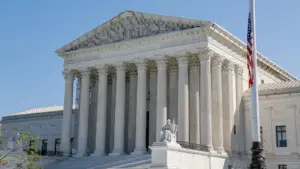As the Supreme Court prepares to assess a case involving state-funded religious charter schools, perspectives diverge sharply. Advocates see it as a chance for religious freedom and educational choice, while opponents warn of the potential violation of the Establishment Clause.
A Legal Challenge for Religious Charter Schools: Bridging or Deepening the Divide?

A Legal Challenge for Religious Charter Schools: Bridging or Deepening the Divide?
The Supreme Court tackles a pivotal case that could redefine the relationship between education and religion in the U.S., following Trump's judicial appointees.
A significant legal battle is unfolding in the United States, potentially altering the educational landscape by re-examining the longstanding separation of church and state. The case under scrutiny involves the St. Isidore of Seville Catholic Virtual School in Oklahoma. Backed by the state, it has ignited controversy as it seeks access to public charter school funding, prompting concern from activist groups and federal agencies about possible constitutional infringements.
This legal examination is widely seen as tied to the influence of President Donald Trump's appointments to the Supreme Court, which now holds a 6-3 conservative majority. Experts suggest that the newly appointed justices may be more inclined to reconsider prior rulings that have historically limited religious educational institutions' access to public funds. The lower courts’ rulings against religious schools based on earlier precedents may be tested, with proponents suggesting that schools meeting state curriculum standards should not be discriminated against due to their religious affiliations.
The St. Isidore institution is a fully online school aiming to integrate a religious framework into its educational approach, while still conforming to the necessary academic mandates. Following its authorization in 2023, legal challenges erupted, spearheaded by organizations aligned with more secular viewpoints. These groups assert that public financing of religious schools undermines the constitutional barrier intended to prevent the establishment of religion.
Former President Trump’s appointed justices, including Gorsuch, Kavanaugh, and Barrett, previously supported the idea that states cannot impose restrictions on schools solely based on their religious character—a principle echoed in the recent Espinoza v. Montana case. Some experts believe this upcoming case could lead to a ruling affirming the entitlement of religiously affiliated charter schools to partake in public funding programs under specific conditions.
Supporters of the initiative, including conservative lawmakers, argue that current educational systems have long discriminated against religious teachings under the guise of neutrality. They claim the ruling could enhance parental choice within education, a stance echoed by various grassroots organizations pushing for increased educational options that align more closely with family values.
Conversely, the Biden administration has indicated opposition to the movement, reinforcing a commitment to preserving the separation of religious and public funding streams. This has generated an impassioned dialogue surrounding the role of faith in education—a topic that resonates particularly among minority populations who feel overlooked by existing public education systems.
As the Supreme Court takes up this contentious issue, the implications of their decision could forge a new path for religious education in America or reaffirm the long-standing boundaries keeping public education secular.






















